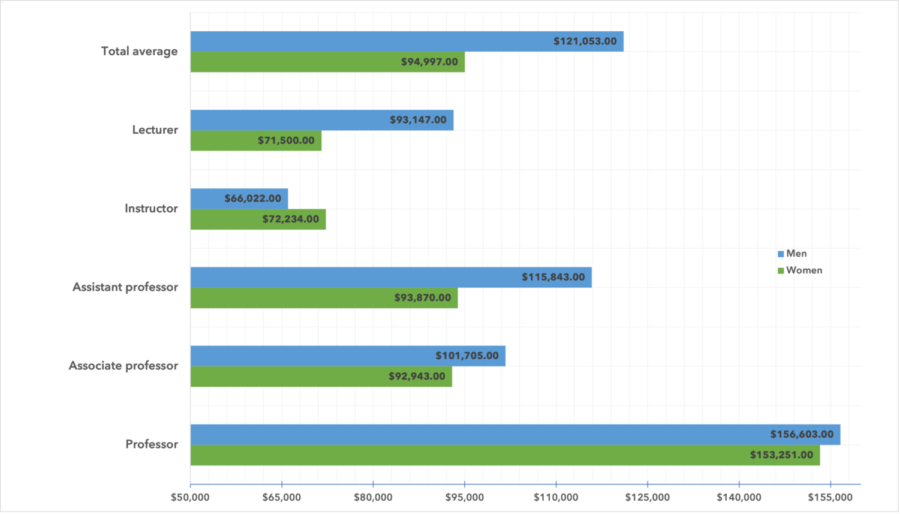Tulane’s pay inequity greater than peer institutions, federal data suggests

Female professors at Tulane University on average make nearly 22% less than their male colleagues, U.S. Department of Education data shows. For those professors, that shortfall equals tens of thousands of dollars in lost income amidst rocketing inflation in the United States.
In 2020, the average salary for male faculty was $121,053, compared to the $94,997 average salary of female faculty members.
On average, male faculty earned $26,056 — 21.5% more than their female peers at Tulane on average.
Pay inequity at Tulane varies significantly depending on tenure status and longevity.
Female assistant professors averaged $93,870 in salary. Male assistant professors, however, made an average of $115,843 — 18.9% more than their female peers.
Assistant professorships are the first step on the tenure-track ladder, similar to entry-level positions for Ph.D. holders. Assistant professors at Tulane have five years to demonstrate command of their field — through academic papers, books and research — to earn tenureship.
Tulane declined to leave leadership available for comment.
In a written statement, Mike Strecker, assistant vice president for communications, said that “Tulane is committed to pay equity at all levels. The provost and deans regularly review salaries to ensure all faculty are fairly compensated. Within departments and disciplines, salary is highly correlated with the number of years a faculty member has worked at the university.”

While female assistant professors earn nearly $22,000 less than their male peers at Tulane, the gap narrows between full professors.
A full professorship is the most senior position on the tenure-track. At Tulane, average female full professors make just under 98% of what male professors do.
Gender pay gap in academia is well-documented in scholarly research and federal data. But, the explanation for Tulane’s pay gap may not be as simple as overt gender discrimination.
“The main reason behind the gender gap is going to be broader societal factors,” Patrick Button, associate professor of economics at Tulane, said. Button described the driving force of the gender pay gap as “pipeline problems.”
The “leaky pipeline” is the phenomenon whereby aspiring female academics in science, technology, engineering and math fields have few female role-models, lack control over research and work and ultimately leave their chosen field before attaining a teaching position.
The pay gap issue is seen at a societal level, “more broadly than Tulane’s,” Button said.
“A lot of the time, it can be that since women receive less mentorship, or they face more discriminatory barriers in the profession — and that extends beyond Tulane, of course — that can lead to fewer women being able to … secure a tenure track position,” Button said.
According to Button, the situation for women in the academy is challenging nationally, not just at Tulane.
“There’s other institutional factors that can matter,” said Button. “Women often have to shoulder a disproportionate burden of child care, elder care.”
“If there are fewer resources provided in graduate programs or when individuals are in faculty in terms of childcare,” Button said, “then that can make it more difficult to balance their disproportionate childcare responsibilities along with their academic responsibilities as well.”
Tulane’s pay gap was larger than 21 of the 37 universities that the Department of Education considers part of Tulane’s peer group.
In that peer group, which included all eight Ivy League schools, Stanford University, University of Chicago and Vanderbilt University, male professors made on average 20.6% more than female peers.
The average salary for women in the peer group was $122,509, compared to $154,823 for men.
“Tulane also has processes and resources available to any faculty or staff who suspects that they or others are victims of pay inequity. The Office of Human Resources and Institutional Equity thoroughly investigates any such reports,” Strecker said.
Tulane ranked second to last in average compensation for both men and women.
Your donation will support the student journalists of Tulane University. Your contribution will allow us to purchase equipment and cover our annual website hosting costs.



Hold • Jan 31, 2022 at 9:01 pm
The Tulane administration actively blocks faculty from sharing information with one another about their salaries in order to hide salary discrepancies. (This despite the fact that Federal law protects employees’ right to compare salaries.) This makes it almost impossible to discover illegal pay discrimination. (Also, the averages listed in this article are dramatically skewed by highly paid faculty in some professional schools. Many full professors barely make the salary listed in the article for assistant professors.